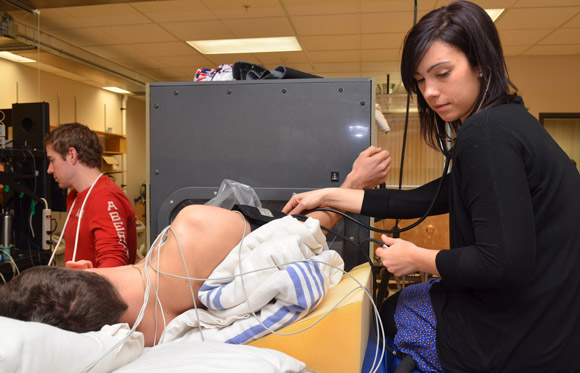
Researcher Nia Lewis takes the blood pressure of a study subject in the Centre for Heart, Lung and Vascular Health at UBC’s Okanagan campus.
UBC researcher finds trouble could arise when drug is used to treat other ailments
An international study led by a researcher at UBC’s Okanagan campus has found that a common blood-pressure drug can cause lightheadedness and possible fainting in some patients.
Nia Lewis, a Canada Heart and Stroke Foundation funded post-doctoral research fellow with the new Centre for Heart, Lung and Vascular Health located in the School of Health and Exercise Sciences, completed a study called Initial orthostatic hypotension and cerebral blood flow regulation: effect of a1-adrenorreceptor activity. The results were recently published in the prestigious American Journal of Physiology – Regulatory, Integrative and Comparative Physiology.

Nia Lewis
Lewis studied patients with normal blood pressure who took the drug prazosin, which is commonly used to treat hypertension, or high blood pressure. The drug is also used to treat other conditions, such as post-traumatic stress syndrome, anxiety or prostate problems. Under these conditions, the drug shows potential negative effects.
Investigators found that all but one of 12 participants who took the medication experienced temporary dizziness or lightheadedness upon standing.
“We were able to determine that, because prazosin shuts down a pathway that is critical to regulate blood pressure, the capacity to safely control blood flow to the brain was also reduced to a level that could induce fainting,” says Lewis.
The drug essentially causes a drop in blood pressure in individuals with normal blood pressure, leaving them at risk of becoming lightheaded or possibly fainting.
“No scientific paper has ever looked at the mechanisms for this,” says Lewis. But identifying what is happening and possibly why is only the first step in a lengthy research process, Lewis says.
“We are trying to understand how the system regulates itself. We are still trying to define what is happening. It’s just the first step in recording and interpreting these results before getting into the clinical work.”
Part of the research shows that the actions of the sympathetic nervous system that would normally prevent the big drop in blood pressure on standing, and consequently prevents an unnecessary fall in brain blood flow, is prevented by the drug, which has sympathetic receptor-blocking properties. By thus blocking this critical pathway, the physiological response can prove dangerous for those patients with normal blood pressure who use prazosin for treating other ailments.
Fainting is quite common, says Lewis, especially when a patient rises from a lying-down position.
The senior author Philip Ainslie, co-director of the new Centre for Heart Lung and Vascular Health and Canada Research Chair in Cerebrovascular Function in Health and Disease, says Lewis’s project plays an important role in understanding the mechanisms involved in human brain blood flow regulation during periods of low blood pressure.
“This research gives science another piece of the puzzle towards our understanding of the regulation of blood flow and how it relates to conditions of low blood pressure and loss of consciousness,” says Ainslie.
The randomized controlled study was conducted on eight male and four female patients, average age 25, with normal blood pressure, using both placebo and the blood pressure drug.
The research team included Ainslie of UBC; Greg Atkinson of Teesside University of the UK; Helen Jones of Liverpool John Moores University; and Emily J.M. Grant and Samuel J.E. Lucas of the University of Otago, New Zealand.
— 30 —